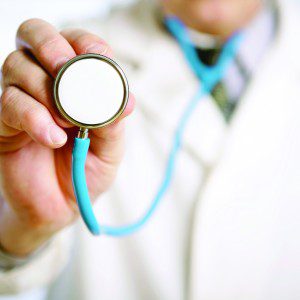Tips from a General & Vascular Surgeon
 Pain when walking, also called claudication, could mean a more serious health condition than muscle strain, according to a general and vascular surgeon at Venice Regional Bayfront Health.
Pain when walking, also called claudication, could mean a more serious health condition than muscle strain, according to a general and vascular surgeon at Venice Regional Bayfront Health.
Peripheral arterial disease (PAD) is a condition that develops when the arteries that supply blood to the internal organs, arms and legs become completely or partially blocked as a result of hardening of the arteries with fat and cholesterol build-up, or atherosclerosis. Atherosclerosis can cause many possible side effects in addition to claudication such as angina, heart attack, stroke, non-healing ulcers and critical limb ischemia depending on the location of the blockage. PAD affects one in every 20 people over the age of 50 in the United States and slightly more men than women.
“Diagnosing and treating PAD will not only save limbs, but will also extend life,” said Wadi Gomero-Cure, M.D., General & Vascular Surgeon, Surgical Associates of Venice & Englewood. “It’s not simply a matter of clogged arteries. It is about improving a meaningful quality of life and, at the same time, extending the patient’s lifespan so they may enjoy their improved function.”
Due to its prevalence, September was named Peripheral Arterial Disease Awareness Month by the US Senate in 2007. Common risk factors include high cholesterol, smoking, high blood pressure, diabetes, atherosclerosis and age. The risk is even higher for those who are over 50 with diabetes.
Dr. Gomero-Cure uses many avenues for diagnosing PAD such as medical history, tobacco use, physical exams and diagnostic tests. He also uses an ankle-brachial index (ABI) test. An ABI test is painless and easy, and involves a comparison between a blood pressure reading in the ankles and a blood pressure reading in the arms. An ABI can help diagnose PAD and a Doppler ultrasound test may be done to find the specific location of the arterial blockage.
Chronic toe and foot sores are common in people with PAD, as are cramping, numbness, weakness or heaviness in the leg muscles. The Venice Regional Bayfront Health wound care center, located at Venice HealthPark, performs tests for PAD and treats chronic wounds which may have underlying conditions of PAD and offers patients counseling on how to manage PAD. However, many patients with PAD do not experience symptoms at all.
“Management of PAD involves lifestyle, function, ambulation and quality of life,” says Dr. Gomero-Cure. He recommends the following action steps to help manage PAD:
• Lifestyle changes such as quitting smoking, correcting blood pressure and cholesterol numbers
– Smoking, high blood pressure and high cholesterol are major risk factors for the development of PAD. Managing these conditions can help improve blood circulation.
• Develop healthy eating habits and an exercise plan
– Exercising can help increase the circulation and reduce pain in the lower extremities. Walking, hiking and bike riding are good exercise options. A personal trainer can help tailor a custom workout plan that best fits a person’s needs.
• Medications
– Always consult with a physician about which medications may help PAD and if they are needed.
• Special procedures and surgeries
– In some severe cases of PAD, surgery may be needed to open arteries that have narrowed. Consult with a physician to see if surgery is a necessary treatment.
Consult with your physician to assess your risk for PAD. If you need help finding a doctor, call our physician referral line at (855) 876-2362.
About Venice Regional Bayfront Health
Venice Regional Bayfront Health is a 312-bed regional health care system that is part of a seven hospital network with 6,000 healthcare professionals spanning 150 miles along the I-75 corridor. It provides a comprehensive array of health care services to the greater Venice area including cardiac, stroke, orthopedic, metabolic, wound care and women’s services. In addition to being an acute care hospital, Venice Regional’s comprehensive services include open-heart, neurosurgery, robotic surgery, and interventional radiology. Venice Regional Bayfront Health has been nationally recognized as a Top Performer on Key Quality Measures by The Joint Commission for the 5th consecutive year, an Accredited Chest Pain Center with PCI by the Society of Cardiovascular Patient Care, a dual Center of Excellence in Metabolic and Bariatric Surgery by Surgical Review Corporation and the Metabolic and Bariatric Surgery Accreditation and Quality Improvement Program, a Joint Commission Certified Primary Stroke Center, American Heart Association’s Get With The Guidelines® – Stroke Gold Plus Quality Achievement Award and Target Stroke and Heart Failure, the Robert A. Warriner III, M.D. Wound Care Center of Excellence Award for the 7th consecutive year, the Wound Care Distinction Award by Healogics for the 8th Consecutive year, and Breast Imaging Center of Excellence by the American College of Radiology. Venice Regional Bayfront Health is affiliated with Gulf Coast Medical Group clinics across Central and South Sarasota County.
Remember that this information is not intended to replace the advice of your doctor, but rather to increase awareness and help equip patients with information and facilitate conversations with your physician that will benefit your health.
About the Doctor:
Wadi Gomero-Cure, M.D. performs general, vascular, robotic and minimally invasive surgeon with Surgical Associates of Venice & Englewood. He received his medical training at University of Minnesota and completed his surgical training at Washington Hospital Center, Georgetown University Hospital and University of South Florida. He is fluent in English and Spanish.







